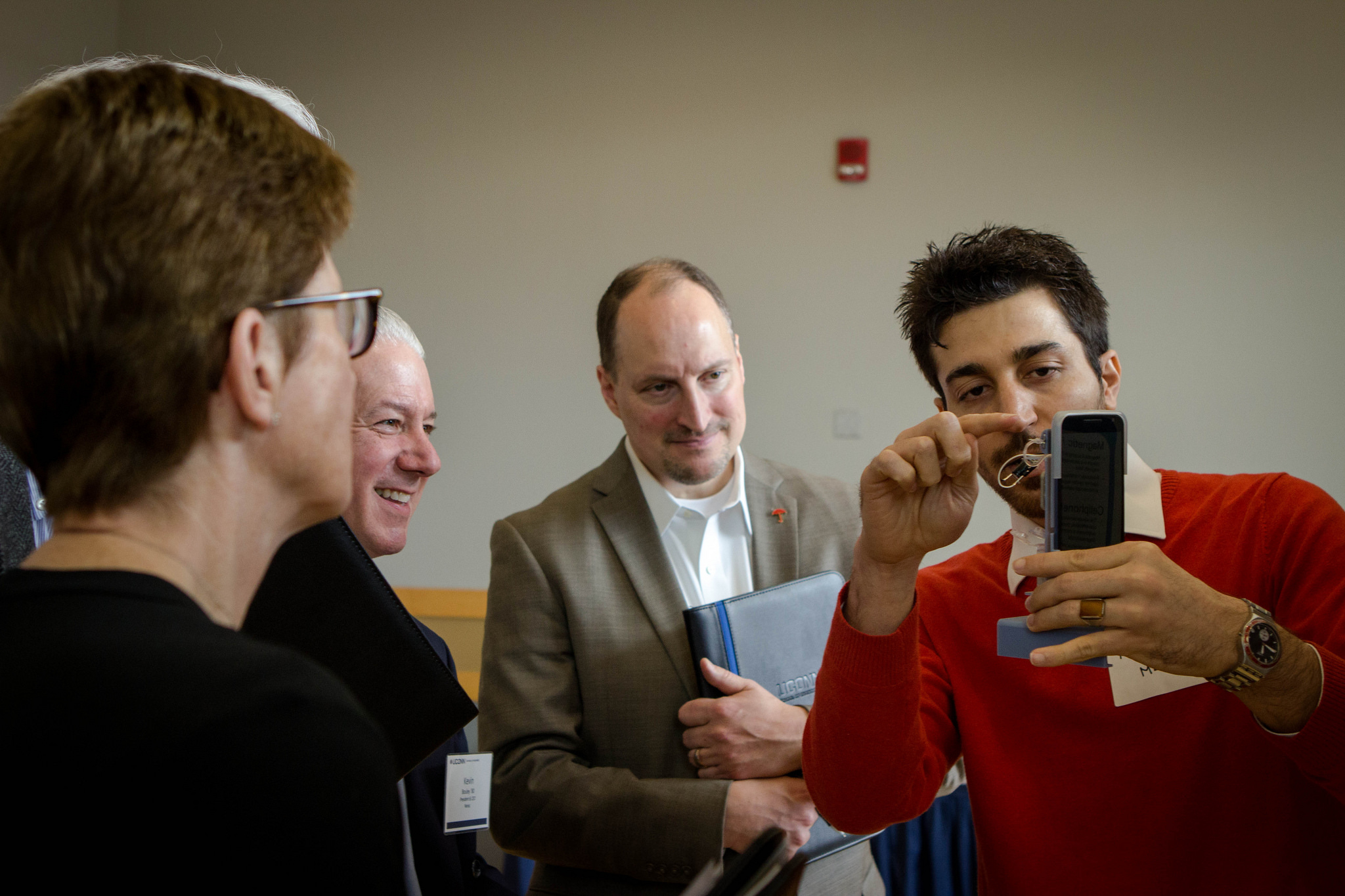Entrepreneurship is one of the riskiest professions an individual can embark on. Many take that journey alone, without a safety net, which often leads towards a tough journey ahead. That’s why support, knowledge, and mentorship are key factors in growing an entrepreneurial venture.
Those key ingredients are baked into the way things are done in UConn Engineering’s two semester Experiential Technology I and II courses, which culminates in an opportunity for students in the class to apply for a “Third Bridge Grant.”
The class, which was started around five years ago, offers graduate students the chance to learn crucial skills in entrepreneurship and technology development, apply those skills towards commercialization with faculty advisors, and gives them the opportunity to be mentored by veteran entrepreneurs.
Led by UConn Engineering Professor-of-Practice Hadi Bozorgmanesh, the class, along with the Third Bridge Grant program, which is co-sponsored by Connecticut Innovations, helps lift innovative start-ups like Encapsulate LLC into success, through crucial funding and mentorship.
Encapsulate, run by UConn Engineering Ph.D. candidates Armin Tahmasbi Rad and Leila Daneshmandi, is developing a cancer treatment testing technology that can be used in healthcare, as well as pharmaceutical applications:
“Our company is offering an automated tumor-on-chip system that grows cancer patient’s tumor cells outside the body and tests the efficacy of chemotherapeutic drugs against them to advocate for the best course of treatment,” Rad said. “Our mission is to offer personalized cancer screening in the most accurate, expedited, and cost-effective manner. We are offering a multi-tumor-on-chip model which is capable of growing ex vivo micro-tumors derived from a patient’s own cancer cells in an optimized hydrogel in 72 hours.”
With 1.6 million Americans being diagnosed with cancer every year, and the success rate of chemotherapy cycles and treatment plans hovering in the 20 percent range, the new technology could identify the right treatment plan for a patient before they even start, increasing their survival chances and saving them un-needed pain and suffering.
Rad and his team, which includes faculty advisors from UConn and UConn Health, received $30,000 in funds from the Third Bridge Grant program, which will be used to help build a prototype and proceed to clinical trials:
“We were fortunate that the Third Bridge board found our idea valuable enough to award us $30,000. We have already completed our proof of concept stage using our previous resources and this grant will be sufficient for us to proceed our venture to the next stage, which would be the prototype,” Rad said. “Through this stage, we are planning to have our first version of the machine for automated testing, and in parallel, start our pre-clinical tests on UConn Health colorectal cancer patients to prove what we are offering can help the oncologists find the best cancer drug for each patient and ultimately save people’s lives.”
Another team that received funding from the Third Bridge program was QRfertile LLC, founded by UConn Engineering Ph.D. students Reza Amin and Stephanie Knowlton, and their faculty advisor Savas Tasoglu, assistant professor of mechanical and biomedical engineering.
QRfertile is an in-home device with a smartphone-based automated analyzer which measures male fertility. The testing process requires the user to load a semen sample on a disposable device, which in turn processes the result right on a smartphone. The technology then rapidly returns measurements of sperm count, sperm motility, fructose, and pH, which are all important factors in analyzing semen quality and fertility.
According to Amin, one in every eight couples in the United States has trouble conceiving a child. Half of the infertility cases are because of the male partner, however, female partners often complete costly and invasive tests before the male partner has any testing. Male infertility is a growing concern because, in the last 40 years, the average sperm counts have been cut in half.
To date, QRfertile has received $70,000 in grant funding from Bio Pipeline CT, Third Bridge, UConn Innovation Quest, and the Connecticut Center for Entrepreneurship and Innovation. The funding from Third Bridge, according to Amin, was one of the earliest, and is helping them to create a product which can be convenient and widely accessible:
“The good news is that, in many cases it is easy to fix but the first step is to get a male fertility test. Our private, easy, and inexpensive test can relieve a lot of pain and frustration for couples who want to build a family at very early stages. Because male fertility issues can be a very sensitive subject, we want our test to be available online or purchased in a pharmacy, eliminating a trip to a clinic or doctor’s office.”
For Amin, without Third Bridge, and the knowledge gained from Bozorgmanesh’s class, he might not be where he is today with his venture:
“As an engineer, I was trained to design, develop, evaluate, and iterate to create new technologies in the lab. With the entrepreneurship course and Third Bridge, I learned how to make my technology commercializable, study the market and competitors, and make a product that could have real-world implications by planning, focusing and having commitment.”
For more information on the Third Bridge program and the Experiential Technology I and II courses, please visit http://www.thirdbridge.uconn.edu.



